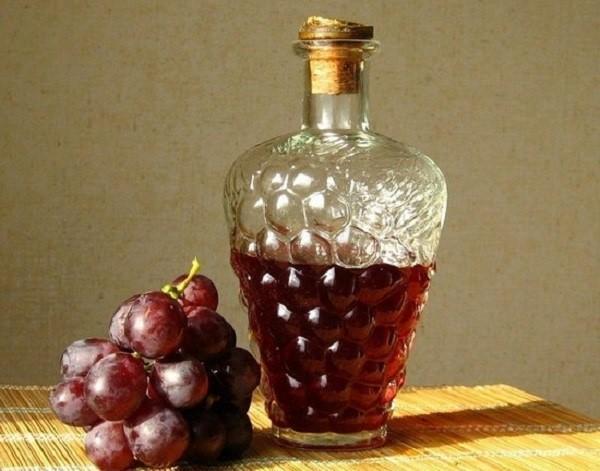Making homemade grape vinegar
 As you know, natural vinegar is the most useful and it is recommended to use it for adding to various dishes. It is quite possible to make such a product at home, especially if there is a vineyard on the site. So, today we will prepare wine or grape vinegar.
As you know, natural vinegar is the most useful and it is recommended to use it for adding to various dishes. It is quite possible to make such a product at home, especially if there is a vineyard on the site. So, today we will prepare wine or grape vinegar.
Ingredients
In order to prepare vinegar, you will need:
- grapes - 1.6 kg;
- sugar - 200 g and 50 g separately;
- water.
For vinegar, it is better to use wine varieties, but in extreme cases, table grapes are also suitable.
Do I need to wash the grapes?
Most housewives prefer to rinse them thoroughly before using any fruits and vegetables. However, as far as grapes are concerned, even in the manufacture of wine, it is often used freshly picked without any processing. There is an opinion that in this way more nutrients are stored in the berries.
Wash or not wash grapes - everyone decides individually, but from practice it has been noticed that there is no particular difference in the product obtained at the output, and harmful bacteria die during the fermentation process.
Making a blank
First of all, grapes should be torn off from the bunches and poured into a glass bottle. For the specified amount of products, a 3 liter container is enough
Now, using a rolling pin, crush the berries so that they let the juice out. Add sugar and pour warm boiled water over the hangers of the jar. Stir well with a wooden spoon to dissolve the sugar.
Cover the bottle with gauze folded in several layers and secure it with an elastic band. Place the blank in a warm place, where it will ferment for two weeks.
All this time, the contents of the jar should be stirred daily.
How do you know when fermentation is over?
The grapes must be fermented in two weeks. The following signs indicate readiness:
- all the berries will settle to the bottom of the jar;
- no foam is formed during mixing.
What to do with fermented grapes?
When the grape harvest is fermented, it must be filtered, getting rid of the berries. Add some more sugar (about 80 g) to the resulting cloudy mass and put the jar in the heat again. Sugar will give the future vinegar a more pronounced berry flavor.
The workpiece should ripen for the second time at least 2 months without human intervention (no need to mix).
After the specified time, the wine vinegar will be ready. It remains only to strain it, separating the cloudy part, and pour into bottles.
It seems that the author has never made wine and related products. Washing the grapes and then putting them on the wine will certainly do nothing. In my grapes, we wash off wild yeast, both wine and vinegar and putrid. You can wash if you then add cultured wine yeast, etc., etc.
Sergey, it feels like you've never tried to ferment washed grapes))
"Knowingly will not give anything" - these are your fantasies. No need to make experimentally unverified statements! To wash off all the yeast from the grapes, you need to wipe each grape with alcohol)) Of course, there is much more yeast in unwashed fruits, but they are also present in washed fruits.
Dirt is washed off much easier than yeast bacteria, so it makes sense to wash if the grapes are purchased (you never know where it was lying around, and which dog raised its hind paw next to it), only you shouldn't try hard to leave more yeast and mash started up faster.
I don't grow grapes myself, but purchased grapes are always mine (not carefully) - and everything works out: it wanders on my own!) But prunes never mine, because they grow on their own plot and I'm sure of its purity.